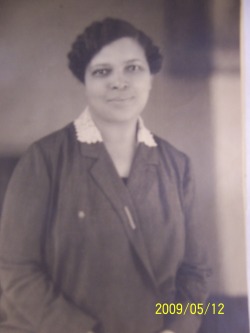Who is Jane Edna Hunter?
A Biographical Introduction

Jane Edna Hunter
Matriarch. Handkerchief Head. Social Activist. Policewoman. Brown Jane Addams. Trailblazer. Godmother. Scholars have employed all of these terms to describe Jane Edna Harris Hunter, one of the most prominent black activists in the development of social services for African American women in the early 1900s. In her autobiography A Nickel and a Prayer, Hunter recounts her rise from the daughter of tenant farmers in Pendleton, South Carolina, to the founder of the Phillis Wheatley Association (PWA), a boarding house and job training center for single black women in Cleveland, Ohio.
Born in 1882 to Edward and Harriet Harris on Woodburn Farm in Pendleton, South Carolina, Hunter obtained a middle school education and found employment as a domestic worker during her formative years. After a brief marriage to Edward Hunter, who was forty years her senior, Hunter moved to Charleston where she worked as a nurse maid for the children of a former Confederate officer before obtaining training as a nurse. After completing additional nursing courses at Hampton Institute in Virginia, Hunter migrated to Cleveland in 1905 where she faced the challenges of finding a good job and safe housing.
In 1911, inspired by a desire to honor her mother’s memory and help other single black women avoid the pitfalls of urban life, Hunter convinced a group of female friends to save a nickel each week and say a prayer with the goal of establishing the Working Girl’s Association, which soon became known as the PWA. By 1927, with contributions from white philanthropists and black Clevelanders, Hunter built a new 11-story facility that ultimately functioned as a community center where blacks in segregated Cleveland could enjoy cultural events and social activities.
By the time she published A Nickel and a Prayer in 1940, Hunter had not only gained national recognition as a social activist, but she had also become actively involved with the Republican Party and other prominent uplift organizations, most notably the National Association of Colored Women. Hunter released a second edition of her autobiography in 1940 and worked at the PWA for another 16 years before retiring. She died in 1971, and the Jane E. Hunter Scholarship published Committee a third edition of A Nickel and a Prayer in 1984.
West Virginia University Press published the new edited and annotated edition of Hunter's autobiography in 2011, ahead of the 100th anniversary of Hunter's founding of the PWA.
Born in 1882 to Edward and Harriet Harris on Woodburn Farm in Pendleton, South Carolina, Hunter obtained a middle school education and found employment as a domestic worker during her formative years. After a brief marriage to Edward Hunter, who was forty years her senior, Hunter moved to Charleston where she worked as a nurse maid for the children of a former Confederate officer before obtaining training as a nurse. After completing additional nursing courses at Hampton Institute in Virginia, Hunter migrated to Cleveland in 1905 where she faced the challenges of finding a good job and safe housing.
In 1911, inspired by a desire to honor her mother’s memory and help other single black women avoid the pitfalls of urban life, Hunter convinced a group of female friends to save a nickel each week and say a prayer with the goal of establishing the Working Girl’s Association, which soon became known as the PWA. By 1927, with contributions from white philanthropists and black Clevelanders, Hunter built a new 11-story facility that ultimately functioned as a community center where blacks in segregated Cleveland could enjoy cultural events and social activities.
By the time she published A Nickel and a Prayer in 1940, Hunter had not only gained national recognition as a social activist, but she had also become actively involved with the Republican Party and other prominent uplift organizations, most notably the National Association of Colored Women. Hunter released a second edition of her autobiography in 1940 and worked at the PWA for another 16 years before retiring. She died in 1971, and the Jane E. Hunter Scholarship published Committee a third edition of A Nickel and a Prayer in 1984.
West Virginia University Press published the new edited and annotated edition of Hunter's autobiography in 2011, ahead of the 100th anniversary of Hunter's founding of the PWA.
© 2009 Jane Edna Hunter Project
